Celtic win Premiership: Opportunity lost despite fifth straight title
- Published
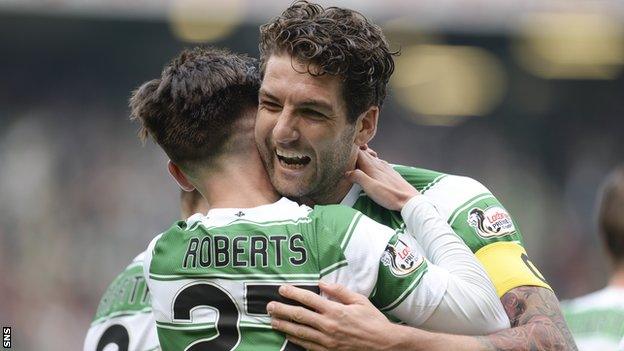
Celtic have secured a fifth successive title
When judging Celtic's league season, and their fifth successive championship, the court of public opinion is worth listening to.
Asked, on Twitter, to summarise their club's campaign in one word, the answers came in a torrent. Of course, many simply went for "Champions" or "Five" or "Winners" or some other variation.
Others went for "Tierney" as in the hugely impressive teenage full-back who appeared on the scene this season and looks now like he's been around for years. "Griffiths" was oft-mentioned, as you would expect for one who has scored so many. No other player got a shout-out. In truth, no other player deserved to.
Ronny Deila has his happy ending, his fond farewell, his two-in-a-row to add to the three-in-a-row from Neil Lennon's time as Celtic manager.
Five straight titles. In most other clubs, in most other cities, in most other parts of the world that would be momentous, a source of unqualified, unquestioning joy, but it's different here. In this day and age at Celtic, it's not necessarily what you win, but how you win it.
Those Celtic fans on Twitter kept coming with their word for the season and their answers were split. For every "Champions" there was a "Forgettable", for every "Five" there was an "Underwhelming", for every "Winners" there was a "Boring", a "Regressive", a "Rudderless". One fan called it "Easy", another just went for "Meh". The word "Equivocal" popped up and that just about captured it.
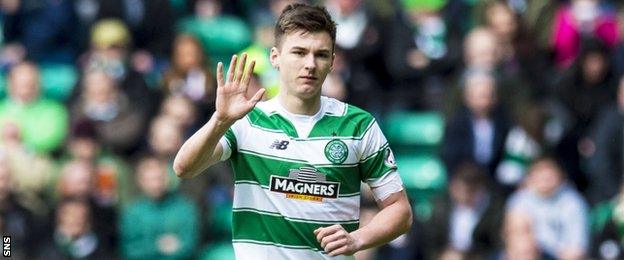
Tierney has emerged as a prodigious talent this season
Too good, but not good enough
Celtic have been too good for Aberdeen but not good enough to keep Deila in a job. This is a deserved fifth title, but it's not one that has been studded with memorable days.
Leigh Griffiths had a sustained excellence about him. Kieran Tierney was the feelgood story, a star who emerged. Beyond that? How many class performances? How many displays that got the fans on their feet in acclamation? How many matches that people will remember for the right reasons?
Fewer than last year and fewer than the year before last. Celtic cannot match their points total, or the number of wins, from those two seasons no matter what they do in their remaining games.
Before Sunday's title-clinching win against Aberdeen they'd dropped points in 11 league matches out of 35. That's 31% of league games they failed to win.
Some of their fans will say that none of that matters, that the only thing that counts is where that league trophy ends up. Maybe. If you dropped the silverware in the back of beyond it could almost find its own way back to Parkhead at this stage, that's true.
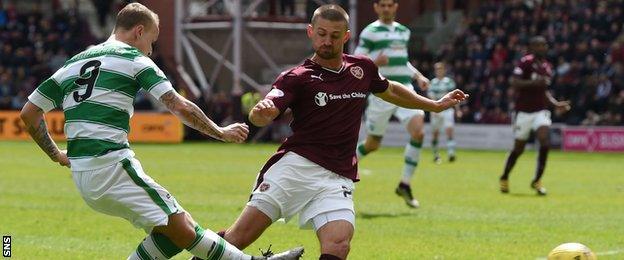
Leigh Griffiths has racked up almost 40 goals for Celtic this season
Celtic should be congratulated on their achievement, but for all the whooping and hollering there is a sense of an opportunity lost in all of this.
Deila could have built a young and settled team with plenty to recommend it, but he tinkered and lost his way, not so badly as to cost Celtic the title but sufficiently to lose him the support of many of those who championed him for so long.
Visions of the future
We go back to a Saturday in late February when Celtic played Inverness in Glasgow in the Premiership.
It was one of those games you went to with a sense that the champions were creaking and vulnerable. Their League Cup semi-final loss to Ross County at Hampden was still fresh in the memory, so too the defeat by Aberdeen in the league that followed it and the awful performance against East Kilbride in the Scottish Cup that came after that.
Celtic had won just one of their previous four matches before they played Inverness that day. John Hughes' team had won two on the bounce - against Motherwell and Aberdeen. They came to Glasgow with some of their mojo restored. At half-time the score was 0-0. Celtic had been awful and were booed off by their own supporters.
What happened in the second half at Celtic Park was part of the reason why Celtic are now champions again - and also part of the reason why it might feel, to some, like a strange kind of glory. Celtic dug in. They scored two goals before the hour and lifted themselves out of a hole.
Then Deila made changes. He brought on Scott Allan for Stuart Armstrong after 63 minutes, Ryan Christie for Stefan Johansen after 67 and Patrick Roberts for Gary Mackay-Steven after 82.
The three of them played behind Griffiths and Celtic scored a third before the end. In truth, they could have scored a fourth, a fifth or a sixth given the intricacy of the substitutes' play; the movement, the devil, the ambition.
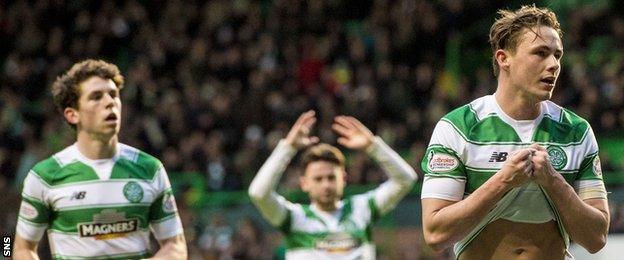
Christie (far left) and Allan (far right) have barely featured for Celtic this season
True, they were playing against a beaten Inverness team at that stage, but that combination of Allan-Christie-Roberts got Celtic fans truly excited, an uncommon occurrence this season. It was like a vision of the future.
Sure, one of the players, on-loan Manchester City winger Roberts, was not one of their own, but you could have put Callum McGregor in there just as easily. Another young player of promise, another guy who offers plenty on his best days.
Celtic fans wanted to see victories but they wanted to see a thrusting new team emerging at the same time.
Wasted talent?
A stadium that was full of anger and frustration at half-time metamorphosed into a much happier place by game's end. The fans had seen a trio of players who had excited them, but they haven't seen them together since. That was the one and only occasion that those three have shared a pitch together.
Christie has yet to start a game for Celtic while Allan has started one. McGregor hadn't started a match for two months until his fine performance against Hearts at Tynecastle last weekend. There is a sense that Celtic could be better, that they have some promising young players on their books if only they were trusted and given the freedom to play.
A quote from Brian Clough comes to mind. In mid-September 1974 Clough was sacked as manager of Leeds United after 44 joyless days. That night, Clough walked into the studios of Yorkshire Television and did a classic interview with journalist Austin Mitchell. What made it unforgettable was the fact that Clough's predecessor at Leeds, and bitter rival, Don Revie was sitting alongside him in the studio.
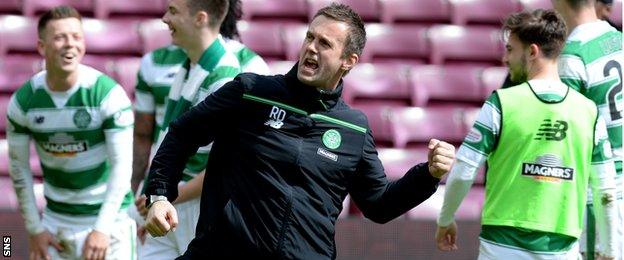
Deila will leave Celtic at the end of the season
At one point in the interview, Revie, the then England manager, goes for Clough, asking him why he took the Leeds job in the first place given that he had never made any secret of his disdain for the hard-nosed team Revie had created.
Clough said in reply that he wanted to do what Revie had done - winning the title - but he wanted to do it better.
He wanted Leeds to play more football and score more goals, he wanted them not just to be saluted as winners but admired as champions. It never happened for Clough - not at Leeds at any rate - but that quote about wanting to do it better still resonates, the essence of it as true today as it was when he came out with it first more than 40 years ago.
Celtic have won the title again, but they haven't won it better.
- Published8 May 2016
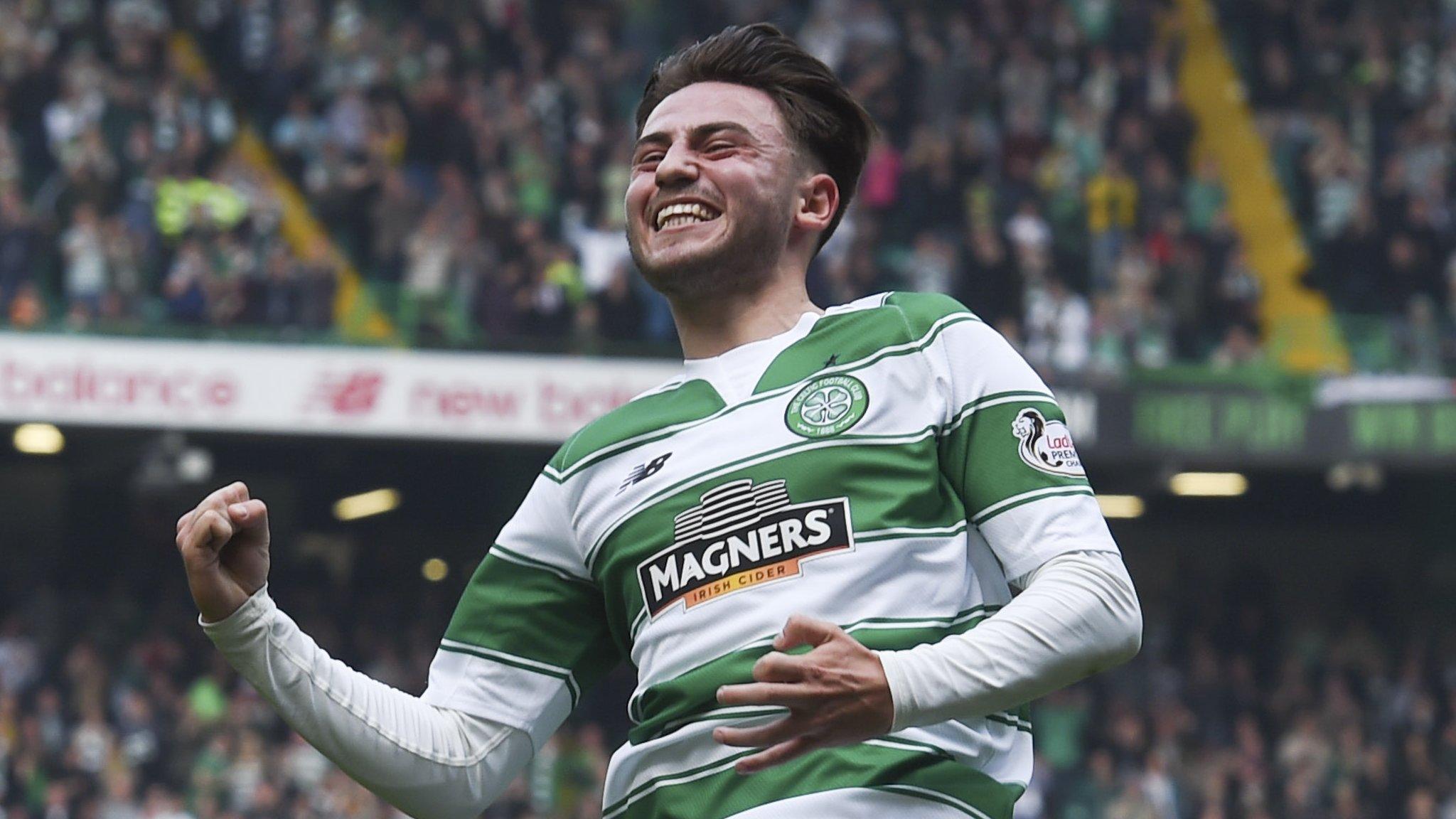
- Published8 May 2016
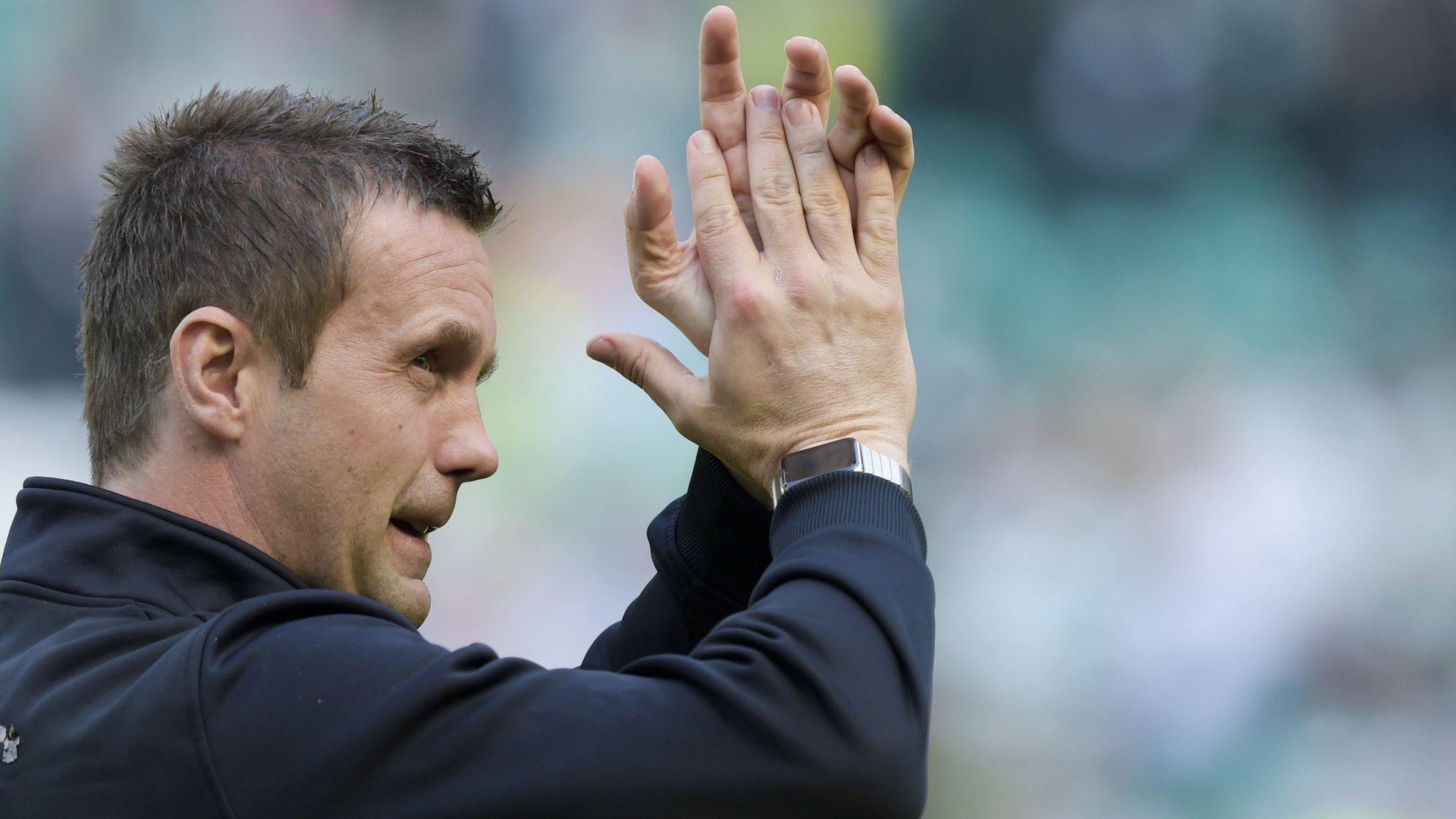
- Published8 May 2016
- Published6 May 2016
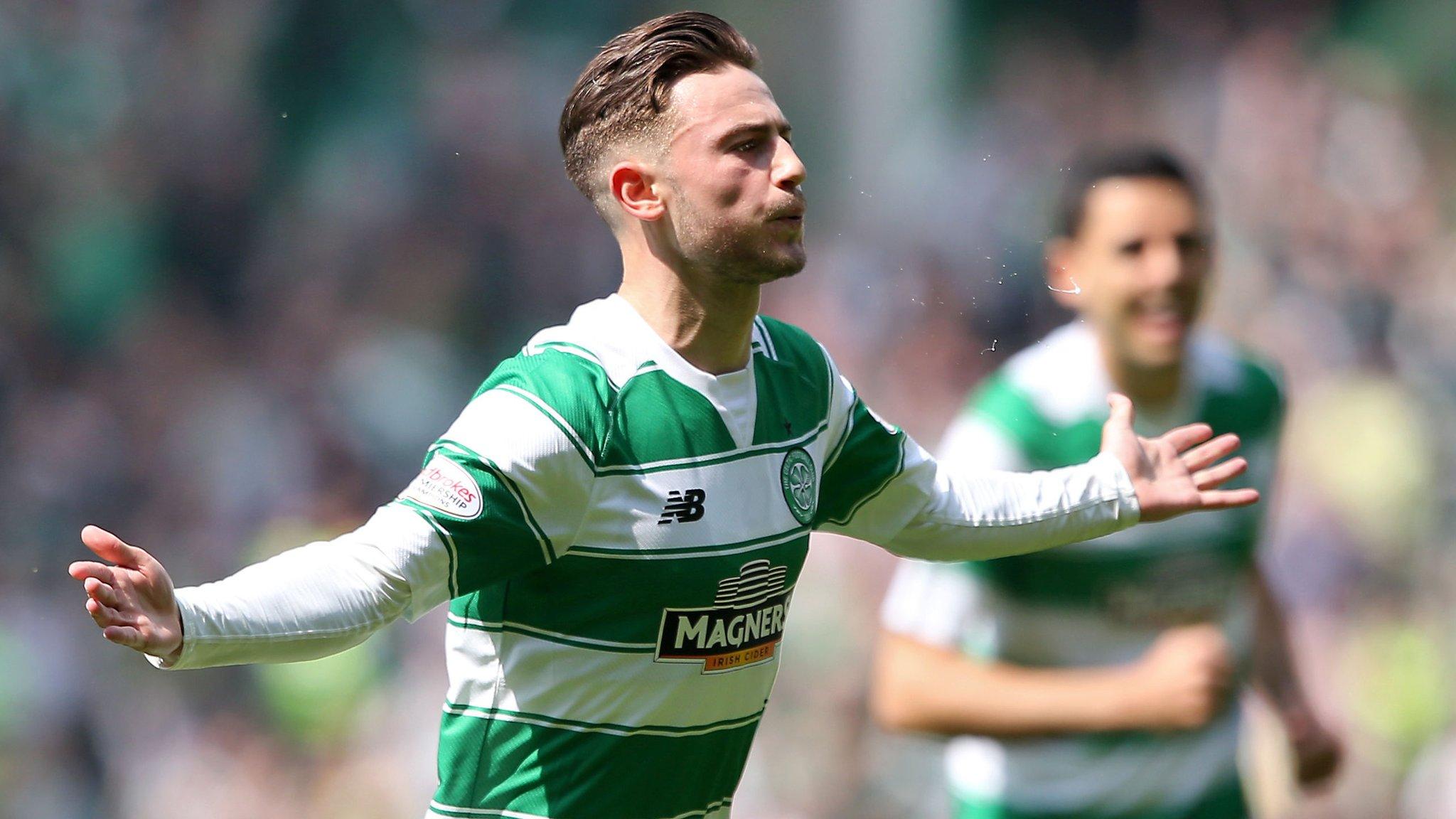
- Published20 June 2016

- Published7 June 2019
